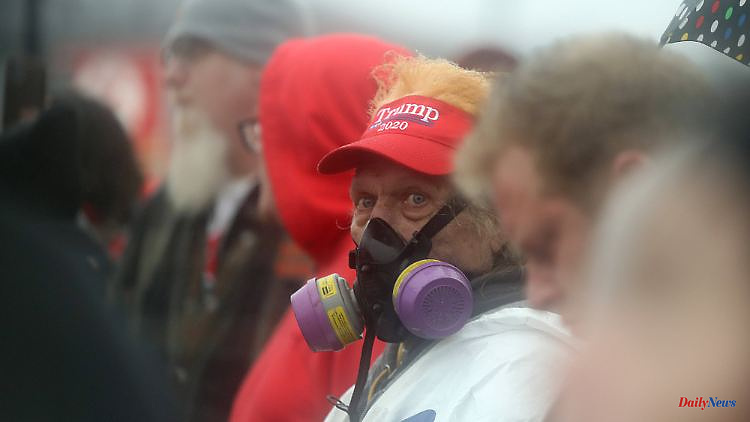In the small town of East Palestine, a freight train derails, chemicals burn, residents complain about the consequences. Ex-President Trump presents himself as a defender of the forgotten - and thus opens the first stage of the election campaign for the White House.
On Wednesday, Donald Trump traveled to the state of Ohio in the north of the United States. Three weeks ago, in the small town of East Palestine there, the train accident that is currently affecting national politics took place. A freight train with three locomotives and 149 wagons crashed, 20 of which were loaded with highly toxic chemicals. The images of the thick, black plumes of smoke and the scorched earth where 38 wagons derailed went around the world. Ex-President Trump spoke to newly elected Republican Senator J.D. Vance and the mayor, and had things explained. His son Donald junior was also there.
A derailed freight train is not uncommon in the US, in 2021 there were 868 of them on the main lines. But it is the circumstances. Trump is already in the early election campaign and wants to return to the White House for the Republicans in 2024. The current Secretary of Transportation for the Democrats is Pete Buttigieg, who wanted to become President as early as 2020. Only this Thursday, one day after Trump, Buttigieg paid a visit to the scene of the accident. He failed to beat Joe Biden in the 2020 primaries. And while Biden is traveling in Eastern Europe because of the Ukraine war, Republicans accuse the president of forgetting people at home. The mayor of East Palestine called Biden's trip to Europe a "slap in the face".
The allegations from the opposition are well calculated. At the scene of the accident, where the poison went into the air and the approximately 4,700 residents no longer feel safe, is one of those rural towns on which Trump's 2016 election victory was based. East Palestine is home to many working-class whites who feel neglected by national politics. In 2016, 68 percent voted for the Republican in the constituency there, four years later, when people elsewhere had had enough of Trump, 71.5 percent gave him their vote. Supporting Vance last year, the "hillbilly" was elected the new state senator.
"This community needs answers and results now," Trump said during his visit. But the cause of the train wreck, its consequences for the residents and the attacks of the Republicans could still fall on his and Vance's feet. The preliminary report from the independent transportation safety agency NTSB found that a wheel bearing overheated and plastic loaded on it set fire to it. Heat sensors on the track had reported the dangerous temperature to the train drivers, whereupon they braked the train. Then the wagon derailed along with many others, including 11 loaded with chemicals; also with vinyl chloride, a flammable, carcinogenic gas. Rescuers spilled the chemicals and set them on fire to avoid uncontrolled explosions.
Residents of East Palestine had been evacuated because of the danger but have been allowed to return to their homes for more than two weeks. According to the authorities, the air and drinking water are clean again. Nobody can really believe that. Yesterday residents complained to the US broadcaster CNN about various symptoms such as dizziness, rash and nosebleeds, some had to throw up. Private train company Norfolk Southern is responsible for cleanup, potential water and soil clean-up and all costs.
"This community has been destroyed," said NTSB boss Jennifer Homendy when presenting the first facts. It is still unclear what caused the overheating and the fire. "It was 100 percent preventable," said Homendy already: "We have never seen an accident that could not have been prevented." The authorities have collected objects at the scene of the accident, will examine them and analyze with various organizations where the error was and how the regulations could be improved. The Department of Transportation and Congress are responsible for that.
The discussions about the train accident are even more than about the accident itself, but also about who can lead the country better. During his presidency, Trump shelved several reforms in the transport sector. He regularly boasted that he had reduced regulations in connection with environmental requirements for companies. The NTSB, the US transport safety agency, could reveal in its investigations whether there were any who favored the chemical accident and are now endangering the health of its voters.
One of them was electronically coordinated brakes, with which all wagons simultaneously reduce their speed and thus the risk of derailing. Unions were in favor a few years ago, while companies were against. Freight trains in the US are often very long, as in this case, which consisted of 149 cars. In order to save on personnel and use the routes more effectively, many different goods are transported at once.
Transport Minister Buttigieg complained about the "energetic resistance" of train companies to stricter safety precautions on such trains. Because of this, initiatives such as those for a better braking system for wagons with toxic, combustible loads failed. That would not have helped in the case of East Palestine: Under ex-President Barack Obama, trains with more than 20 wagons with highly flammable cargo should have such brakes, but Congress delayed this by requiring a prior cost-benefit analysis. In 2017, the first year under Trump, the planned edition went into the wastepaper basket.
Buttigieg also called for potential penalties related to toxic materials and fatalities to be increased. Currently, a maximum of $ 225,000 is possible for offenses: "For companies with annual profits in the billions, that's not enough of a deterrent." The train in East Palestine was also not classified as highly flammable.
NTSB boss Homendy complained about the public discussion. "Everyone jumps to solutions on social media, but none of them help." And when your authority publishes its recommendations after a long, painstaking work, they are ignored: "THIS is frustrating." So far, private train companies have set their own heat limits, i.e. when a train has to be stopped. The measurement is also not regulated down to the last detail. According to Homendy, this, the condition of the wagons and their history and much more is now also being scrutinized.
The NTSB's full outcome, including analysis and recommendations for improvement, is expected to be available in 12 to 18 months. The media battle for the White House could already be in its final phase.












